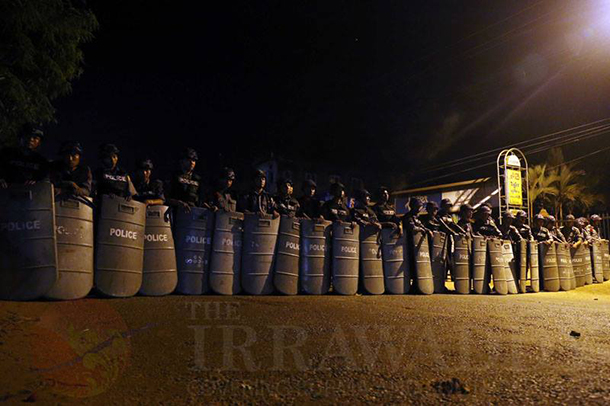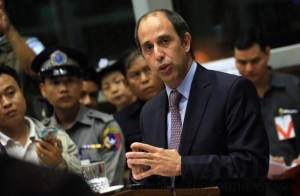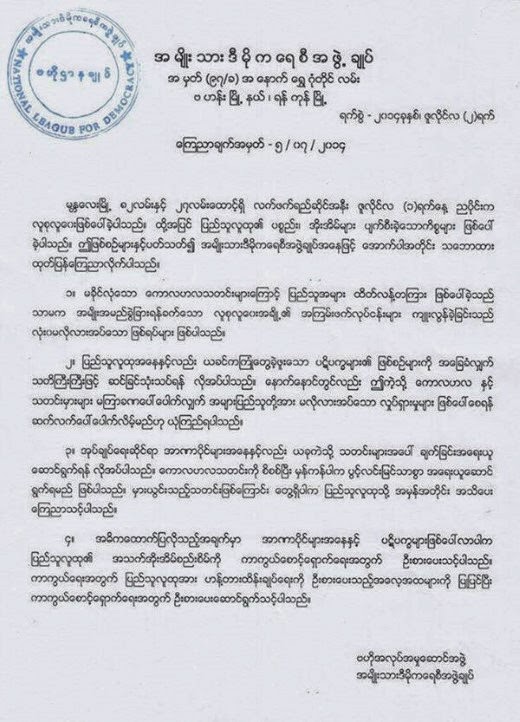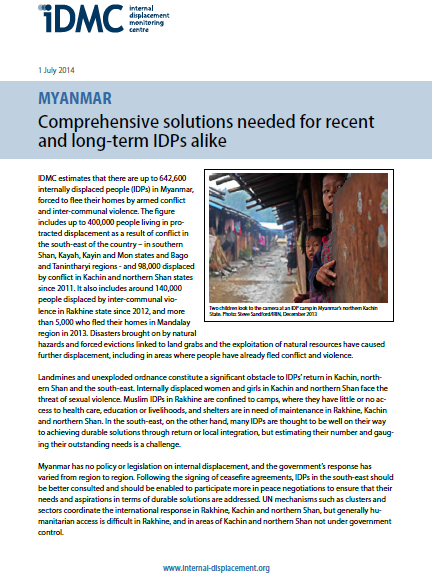Posts Tagged ‘Violence’ (71 found)
Myanmar: Comprehensive Solutions Needed for Recent and Long-term IDPs Alike
IDMC estimates that there are up to 642,600 internally displaced people (IDPs) in Myanmar, forced to flee their homes by armed conflict and inter-communal violence. The figure includes up to 400,000 people living in protracted displacement as a result of conflict in the south-east of the country – in southern Shan, Kayah, Kayin and Mon states and Bago and Tanintharyi regions – and 98,000 displaced by conflict in Kachin and northern Shan states since 2011. It also includes around 140,000 people displaced by inter-communal violence in Rakhine state since 2012, and more than 5,000 who fled their homes in Mandalay region in 2013. Disasters brought on by natural hazards and forced evictions linked to land grabs and the exploitation of natural resources have caused further displacement, including in areas where people have already fled conflict and violence.
Landmines and unexploded ordnance constitute a significant obstacle to IDPs’ return in Kachin, northern Shan and the south-east. Internally displaced women and girls in Kachin and northern Shan face the threat of sexual violence. Muslim IDPs in Rakhine are confined to camps, where they have little or no access to health care, education or livelihoods, and shelters are in need of maintenance in Rakhine, Kachin and northern Shan […]
• • •United States Commission on International Religious Freedom’s 2014 Annual Report
Political reforms in Burma have not improved legal protections for religious freedom and have done little to curtail anti-Muslim violence, incitement and discrim¬ination, particularly targeting the Rohingya Muslim minority. Police failed to intervene effectively and the government has taken inadequate steps to address the underlying causes of sectarian violence or hold individ¬uals fully accountable. State-sponsored discrimination and state-condoned violence against Rohingya and Kaman ethnic Muslim minorities also continued, and ethnic minority Christians faced serious abuses during recent military incursions in Kachin state. Based on these systematic, egregious, ongoing violations, USCIRF continues to recommend that Burma be designated as a “country of particular concern,” or CPC, in 2014. The State Department has designated Burma a CPC since 1999 […]
• • •Poorly Planned Census in Disarray as Calls for Postponement Grow Stronger
 Enumerators arrived in Arakan State on Sunday, 30 March in the company of three hundred armed policemen who were brought into the area in several army trucks to conduct the nationwide survey. The first national census since 1983 should be vital in planning the nation’s needs in health, education and development. However, the census has triggered violence in Arakan State, as humanitarian aid offices were raided, aid workers fled, local aid workers threatened not to assist the Rohingya, and aid to the Rohingya communities living in internally displaced camps has halted.
Enumerators arrived in Arakan State on Sunday, 30 March in the company of three hundred armed policemen who were brought into the area in several army trucks to conduct the nationwide survey. The first national census since 1983 should be vital in planning the nation’s needs in health, education and development. However, the census has triggered violence in Arakan State, as humanitarian aid offices were raided, aid workers fled, local aid workers threatened not to assist the Rohingya, and aid to the Rohingya communities living in internally displaced camps has halted.
So far three people – two under the age of five – have died as a result of the absence of medical care and food prices are soaring as water and food becomes scarce. The Burma government has rescinded their commitment to allow Rohingya’s to self-identify, folding under pressure from Arakanese Buddhists to boycott the census. The tension in Arakan State is spreading throughout Burma as an anti-Muslim riot took place in a town on the outskirts of Rangoon, where an angry Buddhist mob pelted Muslim-owned properties with stones[…]
• • •Burma Army Soldiers Beat, Stab and Rob Villager in Northern Shan State
A villager distributing invitations to his son’s ordination ceremony was beaten, stabbed and robbed by Burma Army troops of LIB 515 in Tang Yan Township, northern Shan State on 23rd March 2014 […]
• • •UNFPA, DFID & Other Donors Should Withdraw Burma Census Support
Burma Campaign UK today called on the United Nations, the Department for International Development (DFID) and other donors to Burma’s census to withdraw their political, technical and financial support in order to avoid further endorsement of discriminatory policies against the Rohingya being applied in the census […]
• • •Rohingya Women and Children Raped and Killed
On 13th January 2014, in the early morning at around 3 am, a group of police, security forces, military and Rakhine entered Kiladaung village, south of Maungdaw, Arakan State. They entered a house and demanded valuables, gold and money from the Rohingya woman living there. Her husband had hidden when they saw the security forces approaching. When the woman refused to give them her jewellery, the security forces raped and killed her. When her children began shouting, many villagers came and violence started […]
• • •Resolution to End Persecution of the Rohingya in Burma Introduced
U.S. Government and International Community Must Help Stop Discrimination and Violence Against Rohingya and other Minority Groups
Physicians for Human Rights (PHR) welcomed the introduction of a resolution that aims to end discrimination against the Rohingya, a minority group in Burma (officially the Union of Myanmar) that is one of the world’s most persecuted ethnic groups […]
• • •Commission Meets with Residents of Strife-Torn Rakhine
Representatives of the Myanmar National Human Rights Commission have met with community leaders and other residents of riot-torn Rakhine State.
Radio Free Asia reported that the Commission members urged the importance of containing communal violence in a bid to uphold human rights, following the deadly clashes that occurred last year […]
• • •UN Special Rapporteur Demonstrates Ongoing Grave Human Rights Violations
 On 24 October, the Special Rapporteur on the situation of human rights in Myanmar, Tomás Ojea Quintana, presented his report to the United Nations General Assembly. The content of Quintana’s report demonstrates a continuing and, in some cases, a worsening of the human rights situation in Burma today, thus illustrating how imperative it is for the mandate of the Special Rapporteur to be continued.
On 24 October, the Special Rapporteur on the situation of human rights in Myanmar, Tomás Ojea Quintana, presented his report to the United Nations General Assembly. The content of Quintana’s report demonstrates a continuing and, in some cases, a worsening of the human rights situation in Burma today, thus illustrating how imperative it is for the mandate of the Special Rapporteur to be continued.
Of particular concern for Quintana is the situation for Muslims in Burma in the wake of a number of outbreaks of violence in the past 18 months. There are currently 140,000 displaced Rohingya living in camps in Arakan State, segregated from the rest of society. Quintana also stated that the Burma government is not doing enough to address the root causes of this violence, one of which is the institutionalized discrimination against Rohingya, denying them legal status under the 1982 Citizenship Law. Another alarming situation for Quintana are the measures brought in since the violence that have placed restrictions on access to livelihoods, education and healthcare that enforced segregation has facilitated. Furthermore, Quintana expressed deep concern over the role of the authorities themselves in instigating the violence: “Allegations of gross violations since the violence erupted last June, including by state security personnel, remains unaddressed” […]











 All posts
All posts